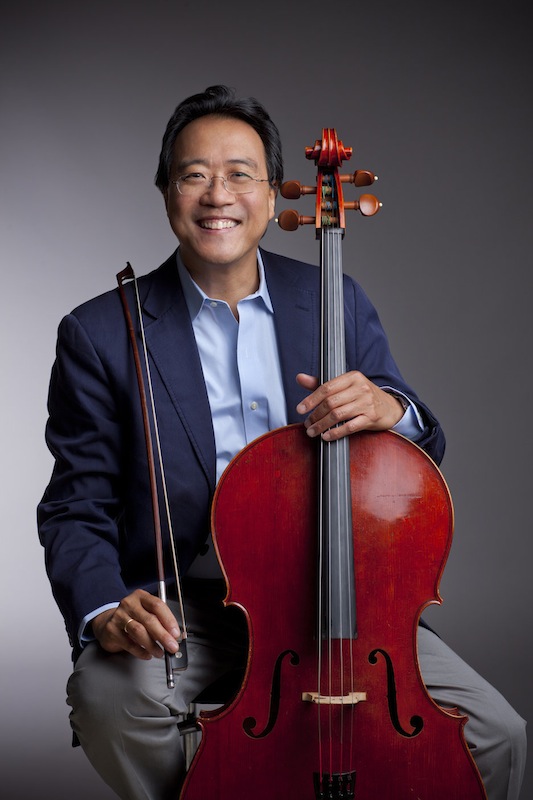Yo-Yo Ma launches Rockport Chamber Festival with exquisite solo performance
The biggest Catch of the Day on Friday in Rockport was being served not at the seaside town’s fish restaurants but at the Shalin Liu Performance Center, where the Rockport Chamber Music Festival had reeled in the peripatetic cellist Yo-Yo-Ma to launch its 2015 season.
The opening performance was preceded by words of welcome from the festival’s executive director Tony Beadle, followed by board chairman Joseph Mueller with acknowledgements and the announcement of a new endowment fund honoring the 20-year (and counting) tenure of artistic director David Deveau. Mr. Deveau was presented with keepsakes of the event, and responded with words of appreciation for his fellow artists and the audience.
At last, the microphone stand, lectern, souvenirs and VIPs were cleared away, and only one object was left onstage: a chair. Yo-Yo Ma made good use of it.
The celebrated cellist’s contribution to the gala evening was an hour-long, intimate program of unaccompanied cello works by Bach, George Crumb, and the Turkish composer Ahmed Adnan Saygun, in which he performed his now-familiar feats of musical prestidigitation, making phrases appear and disappear in midair, often seemingly without the agency of bow and strings.
One was reminded of President Kennedy’s famous remark to a White House gathering of Nobel Prize winners that he felt he was looking at the most extraordinary collection of talent and knowledge in the history of the White House, “with the possible exception of when Thomas Jefferson dined alone.”
Yo-Yo Ma is a genial chamber music partner and a passionate concerto soloist, but something extraordinary happens when he dines alone onstage. Other artists impressively master their instruments; on Friday, the cellist often created the illusion of having no instrument at all, just restless, unfettered musical thoughts.
One had to remind oneself that the gently tapering spiccato, the sudden rush of scales, the legato lines that fluttered like a curtain in the breeze, the phrases related naturally to each other didn’t just happen; an expert jeweler had put each stone in place.
Ma also deftly tailored his performance to the Liu Center hall, which, despite the spectacular view of the Rockport harbor just beyond its glass back wall, remains an intimate space seating just 330. For the most part, the cellist sat quietly, frequently enticing the audience with vanishing pianissimos, and only occasionally swelling the instrument’s resonant bass to fill the room.
Breaking down the wall between audience and performer began, as it often does at a Ma appearance, with a bit of clowning. After smilingly greeting the audience at his first entrance, the cellist reacted theatrically to the harbor vista behind him, then got a laugh by turning his chair around to face the view.
The mood changed with the first notes of the Allegretto from Saygun’s Partita for Solo Cello, a gentle lament that, except for a tendency to burst into efflorescent scales at emotional high points, sounded more adagio than allegretto in this wistful performance. Saygun (1907-1991) is sometimes called “the Turkish Bartók” for his study and use of local folk idioms, and the Silk Road-riding cellist made the most of the piece’s Middle Eastern coloration.
Ma’s performance slipped, pianissimo and without a break, from the Saygun into the Prélude of Bach’s Suite No. 1 in G major, the familiar emerging imperceptibly from the unfamiliar. The steady flow of sixteenth notes in the Bach invites any number of interpretations, and here the introspective mood of Saygun’s piece considerably darkened the Prélude’s affect.
Subsequent movements of the suite also felt the pull of introspection, as Ma probed deeply into the convolutions of the Allemande and the Sarabande and only gently touched on the dance character of the faster Courante and Gigue. Even the suite’s “galanteries,” a pair of minuets, were tailored more for contemplation than for the ballroom.
After the Bach, the cellist acknowledged applause, then picked up where he left off with the mysterious opening Fantasia of George Crumb’s Cello Sonata. Dedicated to the composer’s mother, a cellist, this 1955 piece became the young Crumb’s calling card to the musical world, which he continues to fascinate sixty years later.
Beginning with enigmatic strummed chords, this first movement rose to passionate sixths high on the fingerboard, vibrantly rendered by Ma without a hint of scratchiness. The brief variations movement that followed was vividly characterized (especially in a vigorous pizzicato variation), and the rush of the Allegro vivace finale was dynamic without exaggeration—an assured finish to a piece that must be counted an American classic.
With Crumb’s Sonata as the hinge, the mood of the occasion seemed to turn a corner, and Ma swung into the far more extroverted Bach Suite No. 3 in C major. He gleefully exploited the resonance of his instrument’s open-string low C and made the hall’s wood walls vibrate with a buildup of fast, string-crossing arpeggios.
In contrast with the contorted Allemande heard earlier, this one stepped lively, even strutted a bit. The two Bourrées were jaunty and melodious, and even the Sarabande took an open, even operatic, stance.
Ma’s ebullient performance of the closing Gigue evoked memories of a decade ago, at the gala 100th birthday concert for Boston’s Symphony Hall, when the cellist stole the show from the massed orchestra, chorus, and soloists by dining alone with this piece on the darkened stage.
The cellist sent the gala audience off to dinner with an encore, Le chant des oiseaux by Pablo Casals, rendered with utmost limpidity and tenderness.
The Shanghai Quartet performs at the Rockport Chamber Music Festival 8 p.m. Saturday. rockportmusic.org; 978-546-7391.
Posted in Performances





